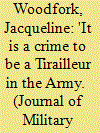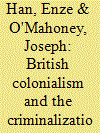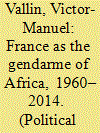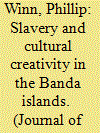|
|
|
Sort Order |
|
|
|
Items / Page
|
|
|
|
|
|
|
| Srl | Item |
| 1 |
ID:
121533


|
|
|
|
|
| Publication |
2013.
|
| Summary/Abstract |
Uniquely among European colonies, some indigenous inhabitants of the French West African colony of Senegal were made citizens of the metropole in the nineteenth century. This originaire status, as it was known, allowed them to, among other things, elect a member of the French parliament in Paris. But, the civil status of the colonial population of Senegal also influenced how its members who served in France's West African colonial army, the Tirailleurs sénégalais, were fed, clothed, housed, and paid. Using oral and archival sources, this article looks at how this cleavage between citizens and subjects influenced the relationship of Senegalese soldiers to the colonial state, the military, their officers, and each other.
|
|
|
|
|
|
|
|
|
|
|
|
|
|
|
|
| 2 |
ID:
132052


|
|
|
|
|
| Publication |
2014.
|
| Summary/Abstract |
What explains the global variation in laws criminalizing homosexual conduct? Recent research has claimed that British colonialism is largely responsible for the criminalization of homosexuality around the world. This article utilizes a newly constructed dataset that includes up-to-date data on 185 countries to assess this claim. We find that British colonies are much more likely to have criminalization of homosexual conduct laws than other colonies or other states in general. This result holds after controlling for other variables that might be expected to influence the likelihood of repressive lesbian, gay, bisexual and transgender (LGBT) rights legislation. However, we also find that the evidence in favour of the claim that British imperialism 'poisoned' societies against homosexuality is weak. British colonies do not systematically take longer to decriminalize homosexual conduct than other European colonies.
|
|
|
|
|
|
|
|
|
|
|
|
|
|
|
|
| 3 |
ID:
137800


|
|
|
|
|
| Summary/Abstract |
THE EMERGENCE OF FRANCE AS THE GENDARME OF AFRICA goes back to the 1960s and the independence of its African colonies. Unlike other European colonial powers, such as the United Kingdom, France was faced late with decolonization and, most of all, wished to maintain an exclusive influence over its former colonial empire. French West Africa and French Equatorial Africa disappeared, but France sought to maintain privileged and lasting political, cultural, economic, and military relations with the former colonies. The new African regimes would receive military and technical assistance from France in return for backing its international policies. Paris thus established a type of nested neocolonial association with these sub-Saharan states of limited sovereignty. This defined France's pré carré in Africa, its area of exclusive action.
|
|
|
|
|
|
|
|
|
|
|
|
|
|
|
|
| 4 |
ID:
099064


|
|
|
|
|
| Publication |
2010.
|
| Summary/Abstract |
In his influential edited volume Slavery, bondage and dependency in Southeast Asia, Anthony Reid suggests that long-term slave-based systems of production were absent from agriculture in Southeast Asia, and had an ambiguous presence at best in other areas of economic activity. The argument he presents suggests that indigenous slavery in the region merged into a 'kind of serfdom or household membership', a situation that continued after the arrival of Europeans whose slave-holding practices were profoundly shaped by the local traditions they encountered: 'slavery in the European colonies owed more to the Southeast Asian environment than to European legal ideas'. Reid's analysis is insightful and his conclusions persuasive. But he also notes a single exception to this general picture: 'the Dutch perkenier system for producing nutmeg in Banda with hundreds of slave labourers on large estates'. The nutmeg estates of the Banda Islands, in eastern Indonesia, provide a rare unequivocal example of a slave mode of production in Southeast Asia, and its sole instance in an agricultural context. The islands have a similar status within established accounts of slavery in Asia more generally. While some degree of geographic and historical variation is usually acknowledged, European slavery practices in Asia are regarded as distinct from colonial slavery in the New World, where European systems were imported wholesale. Against this conclusion, the perkenier system in the Banda Islands has been described as a form of exploitation 'unheard of in Asia', one that represented a 'Caribbean cuckoo in an Asian nest'. In other words, Dutch nutmeg cultivation in the Bandas constituted a New World style system of slavery operating in an Asian context.
|
|
|
|
|
|
|
|
|
|
|
|
|
|
|
|
|
|
|
|
|